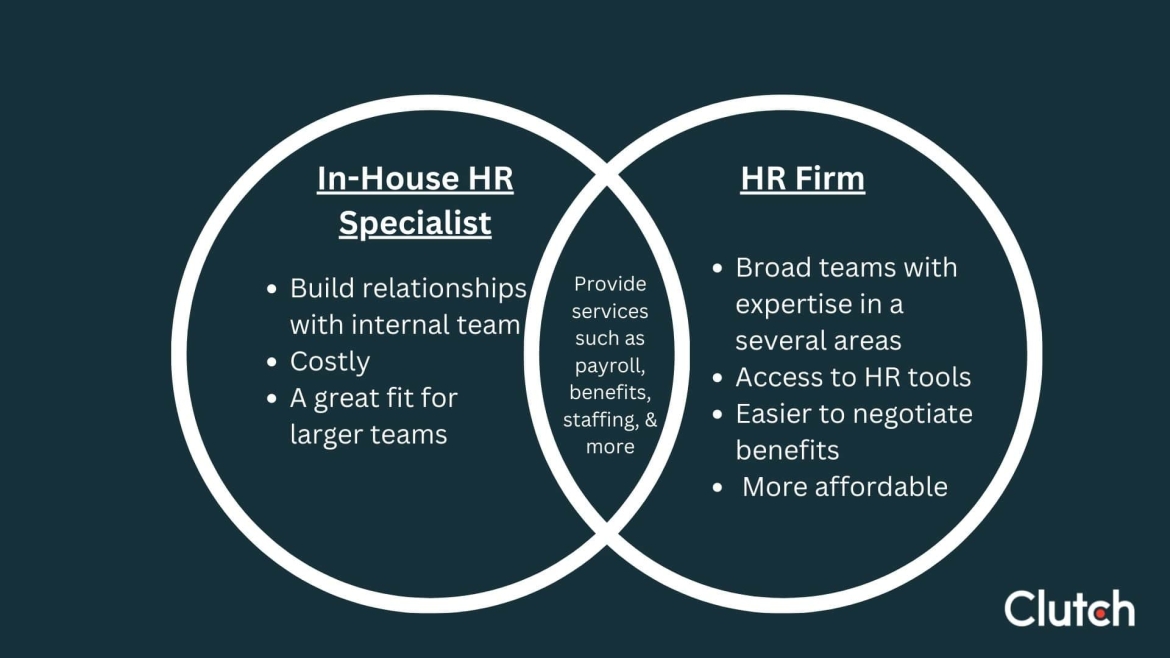

Updated February 19, 2026
Human resources teams support businesses and their employees by negotiating benefits, handling payroll, ensuring compliance, staffing, and more. Determine whether you should hire an in-house HR specialist or an HR firm by weighing the pros and cons of each.
Your business is only as strong as your team. Recruiting, onboarding, and maintaining employee relations is difficult, but it’s more important than ever.
According to recent research, it costs companies 6–9 months of an employee’s salary to replace them, making employee turnover a huge cost for businesses.
Looking for a Human Resources agency?
Compare our list of top Human Resources companies near you
Human resources (HR) teams can help companies attract and retain employees, as well as negotiate better benefits, ensure compliance with labor laws, and much, much more.
What Services Do HR Specialists Provide?
Choosing whether to hire an internal HR specialist or an HR firm is tricky. While they provide similar services and can help improve the workplace, one may be a better fit for your business. Here’s what you need to know to determine which one will suit your needs best.

Looking to hire an HR Firm? Search for top-rated agencies on Clutch. Then filter by location, client ratings, and cost to find the perfect partner for your business.
Human resource specialists are responsible for handling all HR functions from recruiting to payroll, benefits, compliance, and training. Some may even plan events and activities to help foster workplace culture.
However, this can be a big job and requires expertise in several different areas. As a result, many companies need to hire full in-house teams to support all of their HR efforts. This can include a compliance advisor, employee relations counselor, benefits administrator, recruiter, and staffing coordinator.
Many businesses choose to hire an in-house HR specialist or HR team because they can be more involved in building company culture. Here are a few reasons why you may want to think about hiring internally.
Internal HR teams will have a better understanding of how your team operates, internal dynamics, and the unique challenges your team faces. This knowledge is extremely valuable because it can help them determine how they can best support employees.
This can be particularly valuable when identifying training and development needs, during conflict resolution, and even when they begin building a benefits plan.
By building personal relationships with your internal team and being more involved in your day-to-day activities, they can help come up with custom solutions that will provide a better experience for your office. After all, no one knows your team better than those in it.
One of the biggest reasons companies choose to build an internal HR team is because it allows them to build relationships with the rest of the internal team, from the executive level to management and even entry-level employees.
Additionally, companies have more control over company culture when they choose to build internal HR teams. It’s important to remember that HR plays an important role in establishing and communicating workplace values. Often, internal HR teams get involved in culture-building events and social activities, which can improve employee engagement and retention.
In-house HR specialists are able to keep tabs on what’s going on in the office. This can help them stay on top of any issues that come up and ensure that all employees are happy.
This also makes them more accessible. When employees have a complaint or simply want to ask a few questions, it’s easy for them to find someone on the HR team to help. Internal employees usually know who to contact and how to reach them — whether that’s by dropping in their office, emailing, or messaging them through your company’s preferred messaging app.
Either way, communication is an important part of ensuring a seamless working environment. Having an internal team helps that.
While outsourcing your HR efforts is usually more affordable than hiring an internal team, it can be more affordable if you have a significant amount of work for them to do anyway. Because outsourced HR firms charge hourly rates, the cost of working with them increases if you give them a significant workload. In contrast, costs don’t increase for an internal HR specialist.
Therefore, it may make more sense financially to hire an internal HR team if you have many employees. However, the costs may not balance out if you run a small business.
Choosing to hire an in-house HR specialist isn’t something to take lightly. It’s important for business leaders to also consider the cons of hiring an in-house HR team.
While hiring an internal HR specialist makes sense if your business requires a lot of support, it’s important to remember that they are, in fact, very expensive. To hire an HR specialist, companies need to account for recruiting costs, onboarding, salaries, benefits, and continual training. This adds up and can be very expensive.
For many companies, one HR specialist can’t provide enough support for their business, either. Instead, they need to hire a variety of experts that can support everything from recruitment to administration, compensation, and employee relations. This includes Learning and Development specialists, with an average salary of $95,000, and HR specialists, who earn around $50,786 on average, according to Adzuna.
For one person, this is a lot to take on. Building a complete HR team with specialists that can support all your needs can be costly.
Learn more about how much it costs to hire an HR firm in Clutch's HR & Recruiting Pricing Guide.
Employment laws and regulations that guide business operations regularly change. In order to remain compliant, companies need to make sure that their HR team is educated on best practices. This means paying for continuous education and training sessions.
Finally, negotiating benefits can be challenging for HR specialists who represent small businesses. Employee benefits like health insurance, dental, life insurance, and retirement plans are extremely important when recruiting and retaining employees, but it’s difficult for small businesses to offer compensation packages that are on par with larger organizations.
By hiring an HR firm or a professional employer organization (PEO), small businesses can save a lot of money on benefits. PEOs and HR firms have more power when negotiating their rates because they represent many small businesses. Internal HR teams simply don’t have that kind of negotiating power unless they represent an enterprise-sized business.
Additional reading, ‘5 Benefits of Hiring a Professional Employer Organization.’
An HR firm is an outsourced team that can provide a lot of the same functions as an in-house HR specialist. Often companies hire HR firms to work closely with their internal HR teams and provide additional support.
They can provide individual consultants or full teams of experts to fulfill all of your HR needs, from negotiating benefits to organizing performance evaluations.
They charge hourly rates and clients can decide what they need support for, helping companies limit their expenses.
Hiring an HR firm can have a lot of benefits. Here are some of the top reasons to hire an external team.
As discussed above, hiring an internal HR team can be very expensive. Especially for small businesses that don’t require a lot of HR support, it simply may not be worth the cost to hire a full team. Instead, companies can hire an HR firm for an hourly rate and pay for just the services they need.
Compensation packages that include benefits like healthcare, childcare, and retirement plans are more important to employees than ever; providing these benefits can help you attract and retain top talent. Yet, for many small businesses, it can be tough to negotiate with providers.
HR firms that can specialize in managing benefits, like PEO companies, can ensure that you provide top-of-the-line compensation packages for your team.
Managing employee relations, benefits packages, and recruitment is tough enough as it is. There are plenty of HR software solutions that can help, but they can be costly. It can be tough for some businesses to justify spending money on HR software, but many HR firms already use HR platforms and will grant access to their clients.
Finally, handling HR is time-consuming and requires a lot of effort. For small businesses, this can detract from their core functions. By hiring an HR firm, they can reduce their workload and focus more on what they do best.
Even companies with internal HR teams can benefit from hiring an HR firm to collaborate with. For instance, many businesses that have an internal HR team will hire an HR firm to manage tasks like benefits or payroll. In doing so, they free up time for their internal HR team to work on other items like employee engagement or recruiting.
Rather than hiring an HR firm for all of their needs, companies can save money and time by outsourcing to an HR firm for items they need additional support on.
While HR firms can provide a lot of valuable resources and expertise, they might not be the best option for some businesses. Here are a few weaknesses of HR firms.
When you hire an external team, it can have an impact on office culture, especially when you hire an HR firm. HR firms perform core functions that not only ensure your operations run smoothly, but also are key in building office dynamics, team relationships, and tone for the workplace.
Compared to an internal HR team, it may be difficult for HR firms to do culture-building activities like establishing communication channels and planning team bonding exercises. Companies that hire an HR firm rather than an internal HR team still need to be involved in aligning their values and establishing company-wide culture.
No business is exactly the same, and those not involved in day-to-day operations may not understand exactly what your team needs. Compared to internal HR departments, HR firms may not understand exactly what is going on in your organization and how they can help support you.
However, a great HR firm will take the time to survey employees and hold discussions to get a better understanding of your organization’s needs.
Internal HR teams are very accessible to employees — they see them around the office, in meetings, and at social events. Because of this, it’s easier for employees to build relationships and trust their HR team. However, HR firms aren’t nearly as visible.
Without valuable face-to-face time, many employees may be unsure who to reach out to when they have questions or concerns and need HR support. To alleviate this, companies must establish communication channels and an internal team member who can act as a liaison between teams.
While both internal HR teams and HR firms can ensure compliance, negotiate benefits, support recruiting efforts, and more, they each have their own strengths and weaknesses.
On one hand, internal HR teams know your team inside and out and are adept at building employee relationships, but hiring a full team can be costly. Businesses can save money by hiring an HR firm that can negotiate benefits and provide access to HR software.
Especially for small businesses that don’t require as much HR support and don’t have the resources as bigger companies, an HR firm is probably the best option for their business. Plus, HR firms have a full team of experts that can support all of their HR needs.
Looking to hire an HR Firm? Search for top-rated agencies on Clutch. Then filter by location, client ratings, and cost to find the perfect partner for your business.


